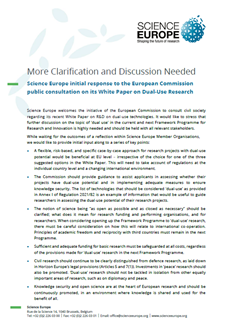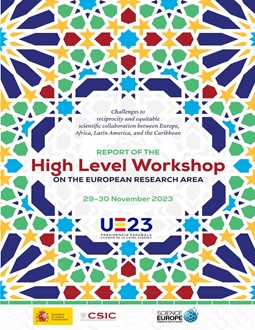
-
Share on
Science Europe Second Workshop on Spreading Excellence and Widening Participation in European Programmes
What can countries do to reduce the R&I disparities in Europe? How can national and European funding be used in a complementary way to widen participation in European programmes? What national measures have been developed to boost brain circulation? On 27 September Science Europe members met to address these important questions and exchange on successful initiatives.
The first workshop focused on Widening/Spreading instruments under Horizon Europe (24 May 2022). On 10 November, Science Europe will co-organise a public event (in Prague and online) with Science Business on ‘Talent retention: How can Europe tackle the challenges of brain drain and capacity building in EU13 countries’. On this date, Science Europe will present a position paper based on the outcomes of these two Science Europe workshops.
More information and registration here.
Understanding the causes of the R&I disparities in Europe is key to identify effective solutions. During the opening session of the workshop, several reasons that explain the lower performances of some countries in European programmes were outlined. Insufficient national investments in R&I were mentioned as well as weaker institutional frameworks, brain drain, and a ‘system learning’ effect: the countries that have a longer history of collaboration and participation in Framework Programmes have more experience and have built their networks. They may therefore have developed stronger knowledge on how to participate (better applications, more coordinators, and work plan leaders) and with who to do so.
All participants agreed that the national investments in R&I are insufficient. The use of the EU tools such as the Structural Funds and the Widening instruments, especially the Teaming programme, has proved successful in several countries. In Estonia, the Structural Funds are largely used to develop R&I capacity, but also to fund the national participation in European Partnerships under Horizon Europe. The Polonez Bis instrument, co-funded by the National Science Centre Poland and the Marie Skłodowska-Curie Actions (MSCA), funds fellowship positions in Poland. This action, which supports brain circulation, also led to the creation of additional jobs (for instance additional research positions for co-investigators to the fellows) and about 60% of past grantees have already secured national funding for stable positions in Poland.
In various countries, national funding or Structural Funds are also used to fund projects that received a Seal of Excellence either from MSCA or the European Innovation Council (previously SME instrument). Complementary national funding can also be used to sustain the outcomes of European Teaming for Excellence projects, or to fund the research activities not eligible under the Centre for Excellence instrument.
It was highlighted though that strong national or institutional strategies are needed, and that the EU funding can only reinforce them.
Boosting individual initiatives, and empowering (young) researchers, was also deemed crucial. At the Charles University in Prague, a support scheme was put in place to increase the number of ERC applicants and ultimately grantees. The Swiss PROMYS programme (Promotion of Young Scientists in Eastern Europe) enables Early Careers Researchers that previously worked in Switzerland to establish their own team in an eligible country that would be suitable under the Horizon Europe widening instruments.
In order to attract and keep highly skilled researchers, a change of mindset was also recommended. Researchers should be encouraged to go abroad, learn, build connections and networks, and come back to their countries. Low salaries can be obstacle for researchers to stay in the so-called ‘widening countries’ but consultations of researchers showed that a static or conservative research culture, and the lack of long-term perspectives, are more important factors in the decision to leave or stay. The recruitment and reward mechanisms in many institutions are no longer compatible with excellence, diversity, and international success and must be changed and adapted to (new) highest-quality standards. Moreover, the research ecosystems must enable access to trainings and mentorship, possibility for researchers to create their own research units, highly skilled support staff, research managers, and technology transfer officers, etc.
Stronger networks are also a key factor to boost excellence. The Alliance4Life gathers 12 Life Sciences institutions from eleven countries of the ‘EU-13’. This alliance aims to become the role model of progressive health research institutions in the region, and increase the visibility of these Life Science institutions. The Alliance’s various areas of actions include collaboration in Health R&I, Science Communication, but also mutual-learning and strategic structural reforms in research ethics integrity, in Human Resources and mobility, etc.
Participants mentioned that pan-European organisations, such as Science Europe, or universities organisations, are very valuable actors and must continue facilitating exchanges to boost excellence across Europe.














